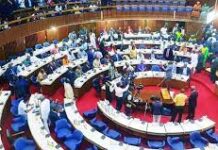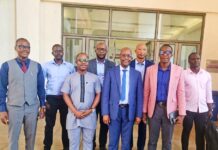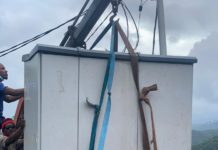Joseph Momoh Conteh
For many years, the Chinese community has played a crucial role in the development of Africa. Africa has benefited greatly from Chinese trade and investment, improving infrastructure, creating jobs, and advancing technology. Chinese enterprises have also given African businesses the urgent financial and technical support they need. Also, the Chinese community has promoted better cross-cultural understanding and facilitated intercultural interactions between China and Africa. Through these interactions, African nations have studied and applied China’s development experience to their economic development. The development of democratic institutions and the struggle against sickness and poverty in Africa have benefited greatly from the contributions of the Chinese minority. African nations and the Chinese people have collaborated to make sure that Africa may realise its full potential and continue its development process.
The Chinese people have significantly influenced the growth of African nations like Sierra Leone. It has become one of the most crucial allies in promoting economic expansion, reducing poverty, and enhancing bilateral ties. Throughout the past two decades, China’s involvement with Africa has increased dramatically, becoming more interwoven with numerous facets of the continent’s growth.
A bright future filled with peace and prosperity is what the Chinese see for Africa. It is a vision of a future in which all of Africa’s people live a better quality of life with robust economic growth and thriving economies. This vision is founded on the idea that China has a special ability to influence Africa for the better. The Chinese hope for Africa aims to make the continent richer and more egalitarian by investing in infrastructure, healthcare, and education. Along with fostering stronger links between Chinese and African citizens, the Chinese hope for Africa also aims to advance environmental preservation and sustainable development in Africa. By working together, the Chinese and African people can create a better and brighter future for the continent.
China offers the resources and investments that Africa needs to further its development goals. In the past, China provided significant financial assistance to several African nations. Chinese businesses today spend billions on infrastructure projects like ports, power plants, trains, and highways. These investments have improved commercial ties between China and African countries, increased exports, raised tax revenues, and produced jobs.
Chinese assistance has helped African nations enhance their educational and healthcare systems and invest in infrastructure through loans and grants. In some of the poorest areas of the continent, these initiatives have aided in capacity building and expanding access to services. Furthermore, scholarships financed by China have made it possible for thousands of African students to attend Chinese colleges to further their studies.
Chinese investment and aid assist in promoting collaboration and understanding between China and Africa. More effective discussions and collaboration on shared objectives are made possible by greater communication and cultural interchange between the two nations. The China-Africa Cooperation Forum (FOCAC) has provided a forum for the two organisations to discuss issues of shared concern, like lowering poverty, fostering peace and security, and boosting trade and investment.
The Chinese community is becoming increasingly significant in Africa’s social sector. The government has implemented several initiatives to lessen inequality in access to food, education, healthcare, and work prospects. Chinese businesspeople have contributed to establishing companies and providing jobs for citizens of African nations.
The Chinese community has considerably impacted Africa’s development and established itself as a key player in promoting economic expansion and reducing poverty. African nations have been able to develop their infrastructure and access to services, foster mutual understanding between the two countries, and lessen inequality thanks to China’s investments and help. The Chinese have demonstrated their commitment to deepening their connection with Africa and assisting it in achieving its development goals through these measures.
China has recently grown to be a significant source of investment in African economies, continuing to increase its influence there. Sierra Leone stands to gain considerably, both politically and economically, as China’s influence spreads throughout Africa. China may help Sierra Leone’s economy by giving loans, investments, and aid; improving its infrastructure; and supporting diplomatic efforts to advance peace and security. Sierra Leone can also look to China for assistance with infrastructural improvements.
In terms of economic growth, Chinese companies have invested heavily in Sierra Leone in recent years, particularly in the mining sector. This has helped create jobs and raise living standards for many Sierra Leoneans, allowing them to benefit from their country’s natural resources. Additionally, Chinese investment has brought new infrastructure and technology, making it easier for Sierra Leoneans to access basic healthcare, education, and banking services.
In addition to economic growth, China’s influence in Sierra Leone has also improved the country’s social, political, and security conditions. Through the Belt and Road Initiative, China has committed to building roads, bridges, and other infrastructure projects to improve Sierra Leone’s transportation network and to increase access to the country’s remote communities. Moreover, China’s support of education programs and health initiatives in Sierra Leone has helped to reduce poverty and improve access to essential services.
China has had a tremendous impact on Sierra Leone since establishing relations on July 29, 1971. From economic growth and infrastructure development to social improvements and security initiatives, China has been an invaluable source of support for Sierra Leone. As China expands its presence in Africa, Sierra Leone will continue to reap the benefits and experience even greater improvements in the years ahead.
The Chinese have played a lead role in infrastructural development in Sierra Leone. In Freetown, the capital city, the National Stadium, Youyi Ministerial Building, Police and Military Headquarters buildings, the new Ministry of Foreign Affairs building, and Foreign Service Academy building, built by the China Railway Seventh Group (C.R.S.G.) Company for Sierra Leone and the Mano River Union Countries, additional offices and renovation for Parliament, the mini stadium in Bo and an ultra-modern China-Friendship Hospital at Jui on the outskirts of Freetown are some of the edifices the Chinese government has constructed in Sierra Leone. China has also built bridges, roads, power transmissions and dams throughout the country.
China-Sierra Leone ties have led to the realisation that modern highways have effectively promoted national economic development and play a direct leading role in transportation, industry and commerce. They are crucial and relevant to the development of education and medical treatment.
The 61.8-kilometre Wellington-Masiaka Highway, constructed by China Railway Seventh Group (CRSG), offers Sierra Leoneans unique infrastructural opportunities with massive social, economic and financial benefits.
China’s technical support to Sierra Leone largely targeted health, education and culture. Chinese doctors play a significant role in the country’s health infrastructure. China was the first country to send medical doctors in significant numbers to Sierra Leone after independence. To date, Chinese medical staff in hospitals across Sierra Leone and the ultra-modern specialised medical centre at Jui, commissioned by former President Ernest Bai Koroma in November 2012, is a clear manifestation of the support of the Chinese government in the health sector. The outgone President noted that “…the Sierra Leone-China Friendship Hospital demonstrate not only my government’s firm commitment to ensuring quality healthcare for our people but also a long-standing relationship and friendship between the Government of Sierra Leone and the People’s Republic of China”. Sierra Leone and China also celebrated 50 years of fruitful collaboration in the medical field.
The Chinese have also supported both middle human resources and higher education of Sierra Leoneans, which dates far back to 1976. Since then, thousands of Sierra Leoneans have benefitted from higher education programmes in China for various professional courses. From 2020-2022 China scholarships were awarded to 280 applicants whom various prominent Chinese universities successfully admitted. The awarded students pursued their Bachelor, Master and PhDs in programs ranging from public administration, education, and politics to clinical medicine, computer science and engineering.
Establishing the Confucius Institute at Fourah Bay College (University of Sierra Leone) by GanNan Normal University (GNU), where Sierra Leonean students are taught Chinese language, culture, and arts, has further deepened cross-cultural exchange between the two countries. The non-profit educational institution was established to enhance understanding of the Chinese language and culture among foreigners, develop friendly relations between China and other countries, foster the development of multiculturalism and contribute to building a harmonious world. The Institute also provides students, faculty and staff opportunities to visit China.
China and Sierra Leone signed a cultural agreement in the exchange of culture, and since then, cultural delegations from the two countries have exchanged many visits. Sierra Leonean artists, notably female artists, have popularised the country’s rich cultural heritage in China, and Chinese artists have also performed in Sierra Leone.
China is Sierra Leone’s second-largest import and export partner after the European Union. Trade volume between China and Sierra Leone reached US$2.61 billion in 2021. Chinese direct investment in Sierra Leone is over $900 million, making China the largest investor in Sierra Leone. Sierra Leonean and Chinese companies signed cooperation agreements in 1984 and began joint ventures. In September 1989, the two Governments signed a trade agreement. China’s main exports to Sierra Leone are mechanical and electrical products, textiles and other light industrial goods, cultural and educational materials, hardware and articles for daily use. There are over 30 Chinese companies currently operating in Sierra Leone. Some major companies include:
Fujian-Africa Fishing Company of China and Okeke Company of Sierra Leone
The Company of International Cooperation on Agriculture, Husbandry and Fishery of China
Chinese companies are also visible in the mining sector; for instance, Shandong Steel in iron ore mines in Tonkolili District. The construction of the only toll road in the capital city Freetown and Huawei Technologies’ cooperation with SIERRATEL, the country’s national telecommunications, are other major undertakings of the Chinese.
China gives low-interest loans to Sierra Leone for infrastructural and other major projects. In 2020, for instance, China waived five interest-free loans due for Sierra Leone, which amounted to over 482 million Yuan (Sino-Sierra Leone Relations 2016).
The Chinese have made significant contributions to the security sector in Sierra Leone. Since the end of the civil war in 2002, China has provided technical and financial support to strengthen the security sector. China has provided technical assistance through training for the Sierra Leonean army, police, and other security forces. Chinese instructors have trained Sierra Leonean security personnel in counter-terrorism, small arms control, and logistics. Chinese personnel have also trained the Sierra Leonean army to operate light weapons and provided maintenance and repair services for military equipment.
China has also provided financial support to the Sierra Leonean security sector. China has provided aid to support the modernisation and restructuring of the security sector. This includes funding for the purchase of military equipment, the construction of military barracks, and the expansion of the security forces. The United Nations peacekeeping effort in Sierra Leone has received active assistance from China. China has supported the mission financially and technically, sending soldiers and equipment. The mission has also received assistance from China in training and capacity building. The promotion of regional security in West Africa has received strong Chinese support. China has backed the ECOWAS Standby Force and taken part in peacekeeping missions by the Economic Community of West African States (ECOWAS) in Sierra Leone and Liberia.
China and Sierra Leone agreed in 2006 to train and equip the country’s armed forces (RSLAF). This agreement covered the delivery of two Type-62 light tanks, three Type-85 amphibious armoured personnel vehicles, and two Type-81 assault rifles. Chinese instructors also trained RSLAF members in logistics and intelligence. China gave the RSLAF a $5 million donation in 2008 to help with modernisation efforts, which included building new barracks. Building a new police academy in Sierra Leone has also received funding from China.
China has helped the security sector in Sierra Leone not only financially but also materially and technically. To assist with post-conflict reconstruction operations, China dispatched a military medical team to Sierra Leone in 2013. China educated Sierra Leonean police officers on crowd control and other topics in 2017. China’s support for Sierra Leone’s security sector has been essential to creating a stable and secure environment in the nation. China has assisted with the training and equipping the nation’s security forces and improved its overall capabilities by providing manpower, equipment, and financial support. Additionally, China has helped with engineering and medical support and given technical and strategic guidance to the security sector.
The Chinese’s aid in Sierra Leone during the Ebola and Covid-19 eras has been tremendous. Right from the onset of the Ebola outbreak, China quickly understood the gravity of the situation and jumped into action. In 2014, it allocated US$2.95 million for emergency supplies, including tents, medical supplies, and food aid. Additionally, Chinese medical personnel were dispatched to Sierra Leone to assist the government in quarantining, treating and curing those affected by the virus. China pledged $3 million in cash and long-lasting supplies like ambulances and medical equipment during the height of the Ebola epidemic, giving the nation crucial help;
Sierra Leone has benefited from Chinese funding in several ways as it fights the Covid-19 outbreak. Chinese businesses and organisations have donated important medical equipment and supplies through direct financial contributions, such as test kits and protective clothing for medical staff. Moreover, Chinese businesses have financially contributed to support patient care and treatment. These resources have aided in improving healthcare facilities and offering more virus-related therapies to individuals who need them. In addition, several Chinese organisations have teamed up with the government of Sierra Leone to train and advise members of the public and health professionals on procedures and best practices for health care. The Chinese people and organisations have worked to raise public knowledge of the pandemic and the associated preventative measures. In addition to its financial contribution, China also donated a state-of-the-art Ebola Treatment Centre in Sierra Leone in 2017, which has been instrumental in the fight against Ebola in the country.
The response to Corona virus Covid-19, China again stepped up. It provided humanitarian assistance to the country in a time of need by donating $20 million worth of items, including masks, gloves, protective clothing and testing kits. In addition to these donations, China has also dispatched medical personnel and experts to provide direct assistance on the ground.
As both the Ebola and Covid-19 pandemics have demonstrated, Chinese aid has been instrumental to Sierra Leone’s recovery and overall development. China has effectively demonstrated its commitment to global health and welfare by providing much-needed resources, supplies, and technical assistance. Furthermore, its continued commitment has been invaluable in the fight against both pandemics, helping to save millions of lives and speed up the recovery process for Sierra Leone.
The justice system in Sierra Leone has received significant support from China. China gave the government of Sierra Leone a $2.5 million gift in 2019 to help the country’s justice system. This grant was used to construct a new courthouse, buy modern machinery and technology, and hire new judges. Also, the Chinese government gave the Sierra Leonean government a $2.7 million loan to help the country’s court system. The funds from this loan were used to construct new courtrooms, upgrade the infrastructure of existing courtrooms, and buy new tools and technology. Also, China has offered technical aid to the government of Sierra Leone to assist them in enhancing their justice system. The funds from this loan were used to construct new courtrooms, upgrade the infrastructure of existing courtrooms, and buy new tools and technology. Also, China has offered technical aid to the government of Sierra Leone to assist them in enhancing their justice system. This involves educating court officials, offering legal counsel and support, and assisting in creating new laws and regulations. In order to help the government of Sierra Leone pay for the wages of judicial officials and upgrade the justice sector’s infrastructure, China has also given financial support to the country. Through these initiatives, China has assisted Sierra Leone’s government in enhancing the judicial system and ensuring that all residents have access to the legal system.








































